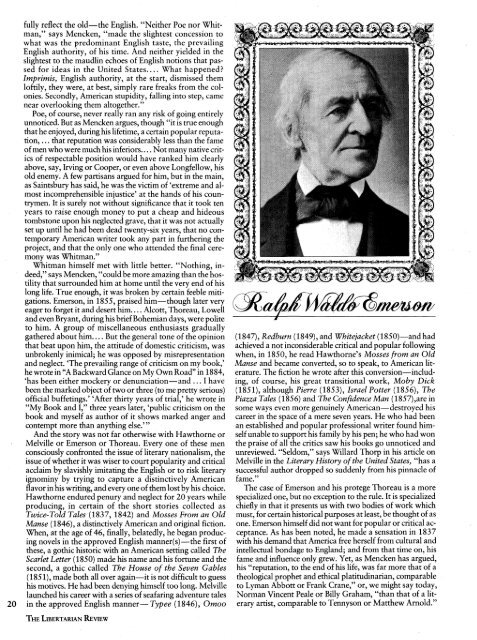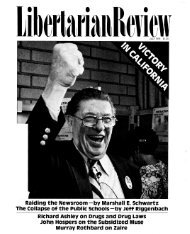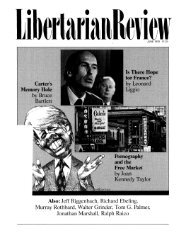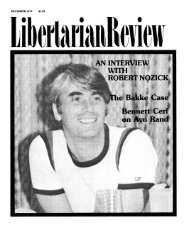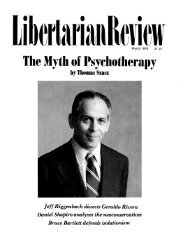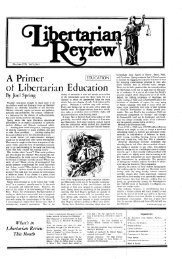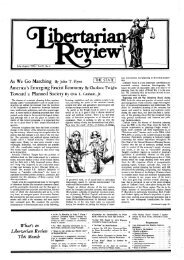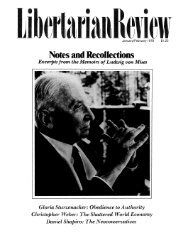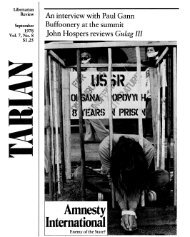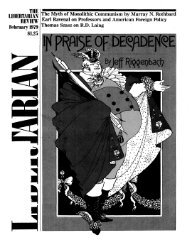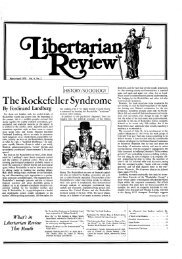20fully reflect the old-the English. "Neither Poe nor Whitman,"says Mencken, "made the slightest concession towhat was the predominant English taste, the prevailingEnglish authority, of his time. And neither yielded in theslightest to the maudlin echoes of English notions that passedfor ideas in the United States.... What happened?Imprimis, English authority, at the start, dismissed themloftily, they were, at best, simply rare freaks from the colonies.Secondly, American stupidity, falling into step, camenear overlooking them altogether."Poe, of course, never really ran any risk of going entirelyunnoticed. But as Mencken argues, though "itis true enoughthat he enjoyed, during his lifetime, a certain popular reputation,... that reputation was considerably less than the fameofmen who were much his inferiors.... Not many native criticsof respectable position would have ranked him clearlyabove, say, Irving or Cooper, or even above Longfellow, hisold enemy. A few partisans argued for him, but in the main,as Saintsbury has said, he was the victim of 'extreme and almostincomprehensible injustice' at the hands of his countrymen.It is surely not without significance that it took tenyears to raise enough money to put a cheap and hideoustombstone upon his neglected grave, that it was not actuallyset up until he had been dead twenty-six years, that no contemporaryAmerican writer took any part in furthering theproject, and that the only one who attended the final ceremonywas Whitman."Whitman himself met with little better. "Nothing, indeed,"says Mencken, "could be more amazing than the hostilitythat surrounded him at home until the very end of hislong life. True enough, it was broken by certain feeble mitigations.Emerson~ in 1855, praised him-though later veryeager to f<strong>org</strong>et it and desert him.... Alcott, Thoreau, Lowelland even Bryant, during his briefBohemian days, were politeto him. A group of miscellaneous enthusiasts graduallygathered about him.... But the general tone of the opinionthat beat upon him, the attitude of domestic criticism, wasunbrokenly inimical; he was opposed by misrepresentationand neglect. '<strong>The</strong> prevailing range of criticism on my book,'he wrote in "A Backward Glance on My Own Road" in 1884,'has been either mockery or denunciation-and ... I havebeen the marked object oftwo or three (to me pretty serious)official buffetings.' 'After thirty years of trial,' he wrote in"My Book and I," three years later, 'public criticism on thebook and myself as author of it shows marked anger andcontempt more than anything else.' "And the story was not far otherwise with Hawthorne orMelville or Emerson or Thoreau. Everyone of these menconsciously confronted the issue of literary nationalism, theissue ofwhether it was wiser to court popularity and criticalacclaim by slavishly imitating the English·or to risk literaryignominy by trying to capture a distinctively Americanflavor in his writing, and every one ofthem lost by his choice.Hawthorne endured penury and neglect for 20 years whileproducing, in certain of the short stories collected asTwice-Told Tales (1837, 1842) and Mosses From an OldManse (1846), a distinctively American and original fiction.When, at the age of 46, finally, belatedly, he began producingnovels in the approved English manner(s) - the first ofthese, a gothic historic with an American setting called <strong>The</strong>Scarlet Letter (1850) made his name and his fortune and thesecond, a gothic called <strong>The</strong> House of the Seven Gables(1851), made both all over again-it is not difficult to guesshis motives. He had been denying himself too long. Melvillelaunched his career with a series ofseafaring adventure talesin the approved English manner- Typee (1846), OmooTHE LIBERTARIAN REVIEW(1847), Redburn (1849), and Whitejacket (1850)-and hadachieved a not inconsiderable criticaland popular followingwhen, in 1850, he read Hawthorne's Mosses from an OldManse and became converted, so to speak, to American literature.<strong>The</strong> fiction he wrote after this conversion-including,of course, his great transitional work, Moby Dick(1851), although Pierre (1853), Israel Potter (1856), <strong>The</strong>Piazza Tales (1856) and <strong>The</strong> Confidence Man (1857),are insome ways even more genuinely American-destroyed hiscareer in the space of a mere seven years. He who had beenan established and popular professional writer found himselfunable to support his family by his pen; he who had wonthe praise of all the critics saw his books go unnoticed andunreviewed. "Seldom," says Willard Thorp in his article onMelville in the Literary History ofthe United States, "has asuccessful author dropped so suddenly from his pinnacle offame."<strong>The</strong> case of Emerson and his protege Thoreau is a morespecialized one, but no exception to the rule. It is specializedchiefly in that it presents us with two bodies of work whichmust, for certain historical purposes at least, be thought ofasone. Emerson himself did not want for popular or critical acceptance.As has been noted, he made a sensation in 1837with his demand that America free herself from cultural andintellectual bondage to England; and from that time on, hisfame and influence only grew. Yet, as Mencken has argued,his "reputation, to the end ofhis life, was far more that of atheological prophet and ethical platitudinarian, comparableto Lyman Abbott or Frank Crane," or, we might say today,Norman Vincent Peale or Billy Graham, "than that of a literaryartist, comparable to Tennyson or Matthew Arnold."
This is partly because Emerson found it most congenialandmostprofitable--to cast his ideas in the form oflectures,which he later reworked into essays; and it is difficult tothink of anyone-save, briefly and meretriciously, RobertIngersoll-who ever made a reputation for himself as a literaryartist by lecturing. And, as we have seen, it is certainlycharacteristic of the American reading public of the midnineteenthcentury that it should have seized upon the strainof pious, moralizing English Puritanism in· Emerson's workas its distinguishing feature and ignored the thoroughgoingindividualism which made it different from anything beingwritten in Europe. But if Emerson never did make a name forhimself strictly as a literary artist, it is probably due atleast asmuch to his actual defects as a literary artist as to his predilectionfor lecturing or to the superficial and Anglicizedtastes of his audience.Emerson lacked, above all, originality. <strong>The</strong>re was a certainoriginality to his thought, to be sure, but it was intertwinedand admixed to such an extent with the contemporaryEuropean ideas he turned to for inspiration thatit is still difficultnearly a hundred and fifty years after the factto clearlyseparate his own ideas from his inspired borrowings. And asa stylist he was, simply, undistinguished; for all their originalityof structural conception and prose style, Emerson'sEssays might almost have been written by any educated Englishmanof the period. Almost. <strong>The</strong> Comtesse MarieD'Agoult said ofthe Essays that they were "not yet art," butadded that "the mingling heretofore unknown, ofthe protestantspirit ofindividualism, or self-reliance, with the pantheisticspirit which inspires this book, the combination andharmonizing ofthese two antagonisms in a superior intellectforms, incontestably, a new element from whence may beborn an original art." It remained for Henry David Thoreauto actually createthe original art which lay tantalizingly nascentin Emerson.'Thoreau was twenty years old in 1837, when, as. amember of the Harvard graduating class to which Emersondelivered his famous remarks on "<strong>The</strong> American Scholar,"he first met the 34-year-old sage ofConcord. He was alreadybookish, already independent-minded, already bent on writing.Buthe was yet unformed, and Emerson set about forminghim. He moved Thoreau into his home, turned him loosein his library, introduced him to his circle of intellectual andliterary friends, published him in <strong>The</strong> Dial. And though itwasn't long before Thoreau was being publicly dismissed asa mere Emerson imitator, he proved otherwise with his firstbook, A Week on the Con,cord and Merrimack Rivers(1849), and rubbedthe lesson in with his second, Walden(1854). Though he had learned his master's lessons well,Thoreau was his own man. He was a greater prose stylistthan Emerson, a profounder thinker and a more original artist.In the Week and in Walden, the only books he publishedduring his lifetime, he invented a new and distinctivelyAmerican hybrid ofthe English essay form and establishedone of the four main currents or traditions in our nationalletters. ,In the English essay from Bacon through Addison andSteele and Dr. Johnson to Lamb, Thoreau's,contemporary,the emphasis is never on the essayist himself, always on hisostensible subject. It is the sine qua non of the essay as aform, of course, that its subject is always, if only implicitly,its author, his mind. "A person~lessay," says Edward Hoagland,"is like the human voice talking, its order the mind'snatural flow, instead of a systematized outline of ideas.Though more wayward or informal than an article ortreatise, somewhere it contains a point which is its real center,even ifthe point couldn't be expressed in fewer wordsthan the essayist has employed. A personal essay frequentlyis not autobiographical at all, but what it does keep in commonwith autobiography is that, through its tone and tumblingprogression, it conveys the quality of the author'smind. Nothing gets in the way. Because essays are directlyconcerned with the mind and its idiosyncrasy, the very freedomthe mind possesses is bestowed on this branch of literaturethat doeshonor to it, and the fascination ofthe mindis the fascination of the essay." But the mind in the Englishessay is typically outward-looking, extrospective. It not onlyavoids autobiography, it avoids even introspection; and it isreally personal, idiosyncratic, individual, only incidentally,only in passing, only in the characteristic attitude-whichnever itself becomes an object of scrutiny-which it adoptstoward whatever happens to be its subject matter.<strong>The</strong> American essay created by Thoreau is another kettleoffish entirely. Itis frankly, even relentlessly autobiographical;its subject matter is the mind of its author-its adventures,its experiences, its ruminations. Always the essayingself is the center ofattention. <strong>The</strong> American essay created byThoreau mightwell be described, in fact, as a kind of selfportraitin prose-exceptthat one ofits greatest and earliestpractitioners, Walt Whitman, has demonstrated that it mayjust as well be crafted in a kind ofprosy and loose rhythmedverse. And whatmore appropriate vehicle than this new kindofessay to give literary form to thatindividualism which is ofthe essence of Americanism?Yet, as we have seen, Whitman found no favor by writingsuch verse essays instead of imitating the officially admiredEnglish models, as Longfellow did. And Thoreau fared no 21MARCH <strong>1980</strong>
- Page 6 and 7: 6of which Taraki and Aminwere membe
- Page 8 and 9: succession of client regimesinKabul
- Page 10 and 11: ~\~~,{AP!10Of windfallsand bailouts
- Page 12 and 13: 12JEFFREY SANCHEZ& ROYA. CHILDS,jR.
- Page 14: JEFF RIGGENBACHThere is a serious p
- Page 18 and 19: ~nwdrl~~O/hood [which] implies an a
- Page 22 and 23: 22better with his essays in prose.
- Page 24 and 25: and Ann Radcliffe. And, as was the
- Page 26 and 27: "Obviously, they did not always tak
- Page 28 and 29: Let us con'sider, briefly, one case
- Page 30 and 31: 30Norman PodhoretzMarchinginstep'RO
- Page 32 and 33: 32nism and Its Friends,"by Walter L
- Page 34 and 35: in Commentary one of themost loaths
- Page 36 and 37: 36and Justice William O.Douglas too
- Page 38 and 39: 38ions as you choose."The statement
- Page 40 and 41: 40gone on for generations, asthe fo
- Page 42 and 43: 42see what I haddone, and thepressu
- Page 44 and 45: 44thors have a serious problem.Can
- Page 46 and 47: 46tion novel, .an attempt toportray
- Page 48 and 49: 48the Russian Embassy by thewife of
- Page 50 and 51: 50CLASSIFIED ADVERTISEMENTS are acc
- Page 52: LAISSEZ FAIRE BOOKSlibertarianRevie


